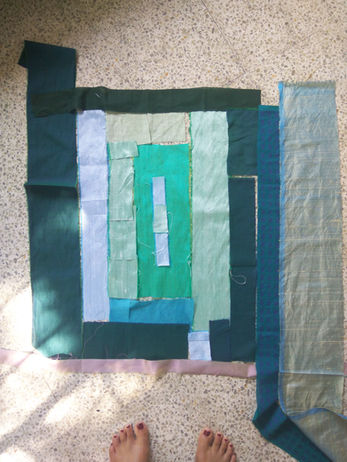PRODUCT CARE
Each product is made by hand, using ethically sourced, pre-consumer textiles that are discarded by the industry. These textiles are unsoiled and unused because they are 'unusable' by the industry due to slight wear-and-tear and weave and pattern defects. We source natural-fibre textiles as much as we can, although due to the sheer volume of discarded fabric that is amassed, we sometimes include material blends as linings and support fabrics to our products.
CUSHIONS & TABLE-LINEN
We recommend spot-cleaning for stains and dry-cleaning if absolutely required. A simple sunning on a terrace or air-drying at home will do to preserve the textile. Do not wash and iron only on low heat.
QUILTS
Quilts should be frequently aired in the sun and spot cleaned. Store in airy muslin or cotton bags or flat on a bed if possible. Quilts must be dry-cleaned every six to eight months.
PRODUCT CARE
Each product is made by hand, using ethically sourced, pre-consumer textiles that are discarded by the industry. These textiles are unsoiled and unused because they are 'unusable' by the industry due to slight wear-and-tear and weave and pattern defects. We source natural-fibre textiles as much as we can, although due to the sheer volume of discarded fabric that is amassed, we sometimes include material blends as linings and support fabrics to our products.
CUSHIONS & TABLE-LINEN
We recommend spot-cleaning for stains and dry-cleaning if absolutely required. A simple sunning on a terrace or air-drying at home will do to preserve the textile. Do not wash and iron only on low heat.
QUILTS
Quilts should be frequently aired in the sun and spot cleaned. Store in airy muslin or cotton bags or flat on a bed if possible. Quilts must be dry-cleaned every six to eight months.
O U R P H I L O S O P H Y
What
we do



Re-examine our cultural ideas of ‘waste’ by using surplus and scrap fabrics to make objects of value;
Re-imagine our ideas of beauty by gently pushing the boundaries of textile design;
Use our design history as a map in finding values that may resonate with and help us to find our grounding in the present.
Founded by textile designer Kamala Murali, kambli – for blanket in Tamil – is a design studio based in Chennai, India. Informed by traditional practices of repair and reuse, as well as ways of textile-making in India and other Eastern countries, kambli draws inspiration from Japanese boro cloth, Korean jogakbos, India’s Siddhi patchwork quilts and traditional kaantha embroideries. There is an honest, distinctive quality to our textile work that explores the potential of pre-consumer discarded and surplus materials, and elevates it to that of luxurious, one-of-a-kind pieces made for contemporary living.





